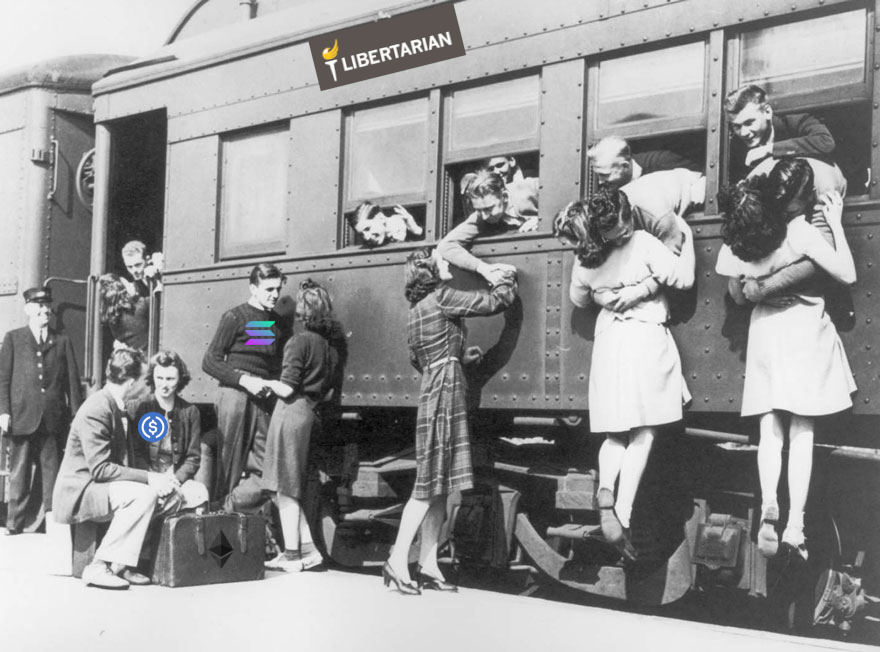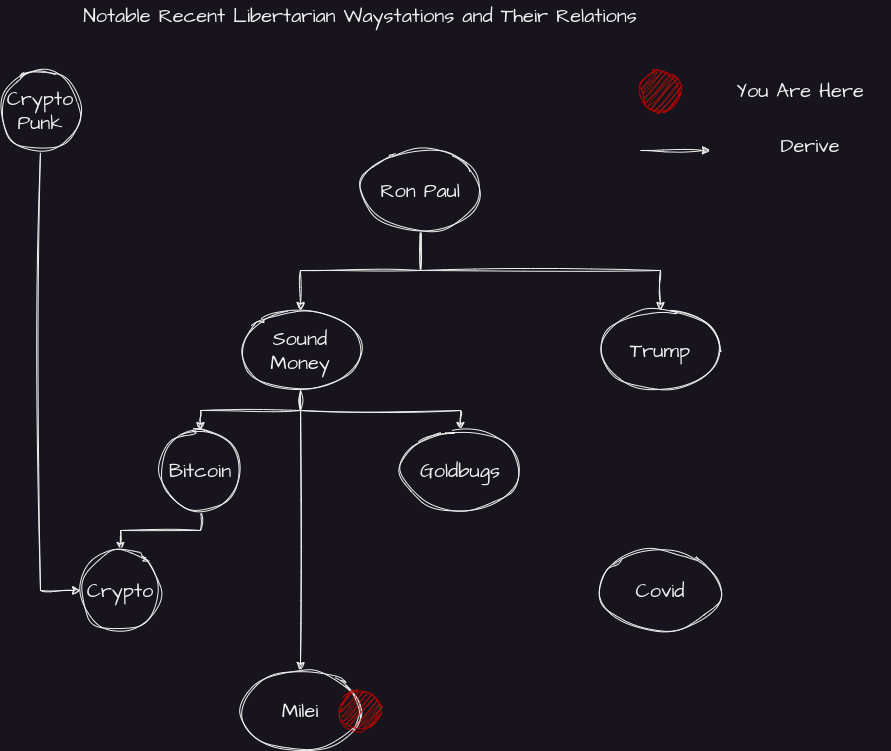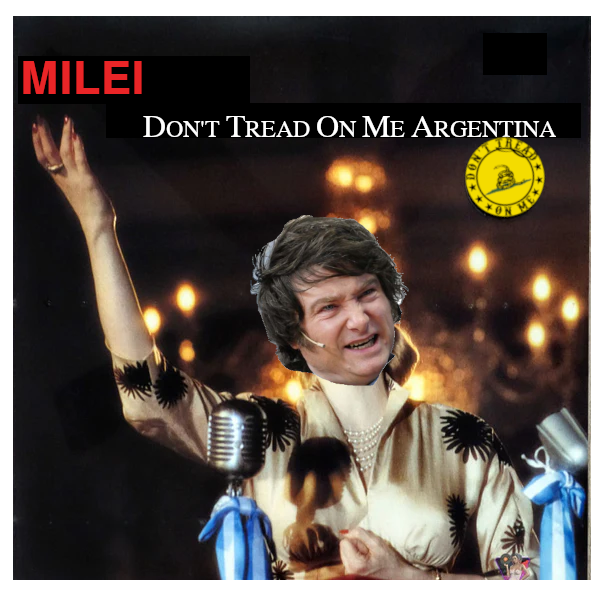Posts tagged "politics":
Goodbye, the Waystation Crypto Libertarians!

It is Stephan Kinsella, one of the authoritative living minds in libertarian legal theory, who coined the term "waystation libertarians" as "Someone who was only 'passing through' libertarianism on their meandering, endless journey through ideologies and faddish, dilettantish interests."
As someone who has been in the libertarian movement actively for almost a decade and is currently retreating to a side project named "Mission: Liberty" due to time conflicts, I should like to have something to say about it.
Considering all other waystation libertarian movements during my time, Ron Paul libertarians, Sound Money (Goldgug or Bitcoin) libertarians, NatCon/Trump libertarians, Crypto libertarians, Covid libertarians, and now Milei libertarians, what I have been entangling my life the most is the sound money and crypto libertarians, where my startup is a business that surviving the post-SBF crypto winter. I have a growing grudge against the crypto libertarians, which I will explain in a moment. But similar to Mr. Kinsella's realization, I really should not.

I will put out my conclusion: the crypto libertarian movement is dead. If it's comforting to hear in a somewhat perverse way, its predecessor, the Sound Money/Bitcoin libertarians movement, is barely limping along, where the biggest hopes are that Blackrock can create an ETF and buy their digital gold! What an abomination!
In fairness, for the libertarian meetups I organize or go to, the Bitcoin movement remains the most activism-oriented and keeps bringing in new energy. Undoubtedly, Saifedean Ammous's works "The Bitcoin Standard" and "Principles of Economics" have inspired young minds to get into the idea of sound money, the Austrian school of thought in economics, and rational individualism.
But crypto libertarians, with its ever-moving targets (and some comical sagas along its way) - from native internet of money to stablecoins backed by fiat; from crowdfunding to VC-backed; from fully decentralized to sufficiently decentralized; from lemonade coin to decentralized physical infrastructure (DePIN!); from peer-to-peer decentralized operating systems (e.g. Urbit) to decentralized social (DeSo!); the list goes on - it is a rather elusive term that after a while, just like other waystation movements, it might have never existed!
So it is perhaps instead, the hope that it ever can exist is dead. In the face of this, anyone can justify their emotion. Anger: how we end up here where no one cares to promote our ideas. Sad and self-pity: how we didn't know better when we brought in detractors and fraudsters. Cynical: libertarian objectives will forever remain fringe. Jealous: look at the ones who joined and made the money; if I had the money, I should fund a movement myself!
There can be an indifferent emotion: it is just what it is. But it is a nonproductive emotion. While I believe the most practical and positive emotion and attitude to the matter is a subtle one. That is a skillful play between a rational acceptance and a wise realization of the libertarian movement under the historical context. Understanding the waystation phenomenon of movement is essential for anyone to come to this realization.
It is a relieving realization and practical attitude:
- If you are still deep in the crypto industry like me, stop thinking about it still being part of the libertarian movement anymore, focus on what is in it for you, and get the job done.
- Think of the whole libertarian movement as a non-stopping train to a destination in which we all share the same faith. Let's welcome the passengers along the waystations we pass through and wish them all good fortune after they hop off.
- To quote a motto of mine from an ancient book of wisdom: "I have fought a good fight, I have finished my course, I have kept the faith."
P.S.
Congrats to Milei, and let us wholeheartedly welcome the upcoming Milei libertarians at our next stop!

[翻译] (Unfinished) 国家民粹主义对比民主
原文:http://www.eurozine.com/articles/2008-06-19-todorovantony-en.html
作者:Antony Todorov
民粹主义运动的威胁不是他们呼吁的直接民主制,而是他们鼓吹仇外的民族主义, Antony Todorov 写道。在20世纪左翼失败的背景下, 可以说极右翼民粹主义在中东欧的新兴民主国家中比在西欧国家中更加的反民主。那么民粹主义可以说等价于民主的危机还是只是这个危 机的一个症状?在最近些年里“新民粹主义“已经是很多研究和分析的主题。尽管方式差异很大,他们的目的或许仍可以总结为:定义民粹 主义和他们的形式;确定当代世界新形式的民粹主义;并分析当今民粹主义所呈现的风险。很长一段时间以来,民粹主义已经是政治科学 家的一个研究主题。历史上,他与出现在世界各地不同时期的一些现象相联系:民粹主义党在十九世纪后期和二十世纪早期的北美;同时 期的俄国民粹派(Narodniki);以及十九世纪德国浪漫主义的völkisch意识形态。民粹主义在二十实际也有过几次表现,比如在世界大 战时期欧洲的均地主义;在意大利和德国的纳粹所用的民粹式语言;亦或者二战后在阿根廷出现的庇隆主义(Peronism)。在他的当代形 式里,民粹主义从委内瑞拉的左翼Hugo Chavez(查维斯)到欧洲的极右翼们(奥地利的Haider, 法国的Le Pen, 或者保加利亚的 Siderov)。考虑到这些现象在血统和历史背景上是如此的混杂,那么问题是:我们能找到哪种程度的共同准则和结构使我们能定义民粹主 义?在后共产主义时期的保加利亚一个关于这个主题的最初的研究里, Evelina Ivanova 写道:一个理论上的关于典型理想的民粹主义 构造的尝试或许可以确定几个主要的原则。Edward Shils,一个北美民粹运动的学者指出卓越的人民意愿超越传统机构的领导人和任何社 会阶层的意愿,并且指出建立不经过机构调解的人民和统治精英的“直接”关系的愿望。Worsley 补充了“大众参与”的多种形式,包括伪参 与(pseudo-participation)。民粹主义经常预先假定(宣传和要求)极端形式的民主,并且通过“人民”为政治职位、政治行动和政治手段 的合法化提供合适的形式。它代表了通过不同形式的直接民主建立与人民大众直接接触的理想目标。



